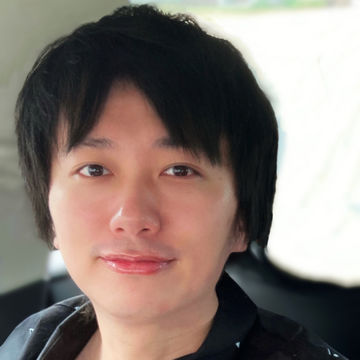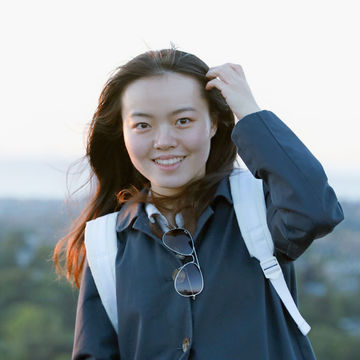Graduate Students
Ph.D. Students

I was born and raised in Florida. I have studied Chinese since high school. From FSU, I have a BS in neuroscience and equivalent coursework for a BA in Chinese language and culture; I pursued a career in the humanities for my M.A. degree, which is in EALC with a focus on Chinese language and culture. I have been an avid reader of science fiction and fantasy since childhood. My academic research interest is in Chinese diasporic literature, with my past work focusing on neuroaesthetic analysis of these works. My notable research thus far has focused on Nieh Hualing’s work Mulberry and Peach.

Yan Chang’s project centers on intra-East Asian trans-lingual literature and media in the post-Cold War period. His academic concerns also include kitsch, visuality, and modernity of modern Japanese literature in the Taisho period, and Shanghai urbanization and media representations in the 1990s.
Before joining Stanford, Yan received an M.A. in Japanese Culture Studies from Nagoya University and an M.A. in Asian and Middle Eastern Studies from the University of Minnesota at Twin Cities.

In my dissertation, “Wen and Wu: The Figure of the Soldier and the Limits of Violence in PRC Culture,” I aim to challenge current understandings of PRC political culture, provide an immanent critique of PRC state violence from within the PRC's own premodern and socialist traditions, and reveal potential critical resources for addressing global environmental injustice from a non-western, ecocritical standpoint. To do so, I explore the reception in PRC culture of premodern warrior depictions, including those from frontier poetry, historical accounts, and novels. By putting theories of political theology into conversation with ecocriticism and Neo-Confucianist ideas on the continuity of being in Chinese culture, I contend that the incorporation of such depictions into the figure of the modern soldier reflects a particular PRC mode of modern state violence.
In addition to my dissertation research, I have pursued extensive coursework in second language pedagogy, have taught Mandarin Chinese as a second language at the university and high school levels, and am currently teaching Mandarin Chinese as an Assistant Professor at the United States Defense Language Institute in Monterey, California.

My dissertation, Untouchable: On the Cultural Politics of Hands in Modern China, aims to produce new understandings of intimacy, alienation, labor, and violence in the modern era through the interdisciplinary study of tactile culture. The project explores the many powers invested in human hands through narrative, taking a particular interest in the discourses and social mechanisms that contribute to the construction of "untouchable" people and groups. My research is supported by a Mellon Foundation Dissertation Fellowship in 2021-2022 and an AAUW American Fellowship in 2022-2023.

My broader fields of interest are pragmatics, sociolinguistics, and linguistic anthropology. I investigate into mundane discourse which facilitate hegemonic power structures in a variety of spaces. My study aims at shedding light on such ideological phenomena in various social spaces and to re-think how each individual can empower those who are often marginalized from such hegemonic discourse. I'm looking forward to working with scholars from trans-disciplinary perspectives to eventually make my research accessible to audience from diverse socio-cultural background. In my free time, I do love cooking different types of world's cuisine following YouTube cooking videos. I also enjoy music and singing as well.

Akira (pronouns: she/her) is a Ph.D. candidate in Japanese. Her dissertation project explores the intersection between queerness and disability in modern and contemporary Japanese literature.

Background: B.A in Chemistry (2019), M.A. in Archaeometry (2022)
Research Interests: Origins of civilization; ancient alcohol beverages; ancient ceramics
Hobbies: Liquor; travel; ball games.

Sijia Li is a Ph. D. student in medieval Chinese literature and literary culture, focusing on textual production, transmission, and reception. Also interested in premodern Japanese literature, she is curious about cultural exchange across East Asia.

Bingxiao Liu is a Ph.D. student in the Department of East Asian Languages and Cultures at Stanford University. Her research interests include premodern Chinese literature, cultural and intellectual history; gender and sexuality; emotions, literary and political culture. Her research examines how emotions are invoked or invented to constitute interpersonal ties in 3rd - 6th century China. Working with official histories, commentaries, inscriptions, and literary works, her project explores the reconceptualization of identity and community in emotive terms and the signification of emotion as the legitimizing basis for a new social order in medieval China.
Bingxiao received her MA in Chinese Language and Culture from Stanford University. She also holds a BA in Chinese Language and literature, and a BA in Journalism from Fudan University.

My dissertation revolves around the genre of zuihitsu in Japan during the first half of the 20th century. I read the protean literary form in relation to subjectivity, coloniality, the act of travelling, and print capitalism.

My research explores how perceptions, categories, and values surrounding language inform language ideology, and the ways in which language ideology in turn transforms use of language. My work brings together methods in semantics, pragmatics, discourse analysis, and computational linguistics in analyzing texts about language written in late 19th and early 20th centuries Japan, while drawing comparisons with coeval sources in French, German, and English.
I was a 2021-22 Digital Humanities Graduate Fellow, and 2022-23 Senior Graduate Research Fellow with Stanford's Center for Spatial and Textual Analysis. My DH research incorporates methods from natural language processing to examine the occurrence, context, and semantic instability of political neologisms in Japanese diaspora newspapers.
Prior to joining the Department of East Asian Languages and Cultures at Stanford, I completed a Master’s degree in East Asian Regional Studies at Columbia University. My thesis contextualized representations of foreigners and foreign places in Japanese junior high school textbooks within the broader history of internationalization in the public school system.


Research interests: pragmatics, semantics, sociolinguistics, 役割語 (role language)

I obtained my Bachelor’s degree in foreign languages from University of Nigeria and my Master’s degree in Teaching Chinese to Speakers of Other Languages from Sichuan University China. I am particularly interested in Chinese literatures and look forward to an increased knowledge and appreciation of the Chinese literatures and culture during the course of this program. Additionally, I am interested in second language acquisition. I speak both English and Chinese language fluently. During my years in China, I have taught both Chinese and English as second languages at the elementary and intermediate levels. Outside school and work, I enjoy cooking, dancing and traveling.

Hello! I'm Matthew Palmer (he/him/his), a Ph.D. candidate in East Asian Languages and Cultures with a Ph.D. minor in Linguistics. I am fluent in English, Modern Standard Chinese (Mandarin), and Japanese. My research focuses on the intersection between corpus linguistics and computer-assisted language learning. Outside of the office, I enjoy exercise, meditation, and moviegoing.

Jie Shen works in Chinese archaeology and osteoarchaeology, especially focusing on exploring the technology of bone artefacts with experimental archaeology methods. Jie’s master’s thesis worked on the decorative techniques of Basket pattern (篮纹) in the Qijia Culture and did a series of replicate experiments.

Ya-Ting Tsai’s primary research interests lie at Chinese linguistics and culture. She is particularly interested in how socio-political separation between China and Taiwan leads to cultural change, and how this difference is manifested in her mother tongues, Taiwanese and Taiwan Mandarin.

William Varteresian received a B.A. in International Literary and Cultural Studies from Tufts University and an A.M. in Regional Studies East Asia from Harvard University. He has since pursued a career in Japanese media translation, including novels, film, television, and comics. Following past research into the way Japanese mystery and science fiction engage with imported works and orientalist narratives, his current focus is on the formation and development of the fantasy genre in modern Japanese literature. In addition to original fiction—especially by authors not represented in English translation or scholarship—he seeks to highlight the work and influence of Japanese translators and critics.


My research focuses on portrayals of masculinity in literature and other representational media in transhistorical and cross-cultural contexts as well as on fandom formations and viewership’s engagement with media-mix. Prior to joining the Department of East Asian Languages and Cultures at Stanford, I received BA in Japanese from University of Oxford. In my undergraduate dissertation, I explored how the auditory mode and the intervals of kamishibai art contribute to the creation of a diegetic process. During my year abroad at Kobe University, I studied the concept of ma in Japanese politics, the use of negative space in rock gardens, and the role of silence in soundscapes. My methodology combines approaches from media, film, and reader-response theory.

Medieval Chinese literature and history, Chinese shi poetry, gender studies in medieval China

Lingjia Xu is a Ph.D. student in modern Chinese literature, film, and media studies. She also holds a Ph.D. minor in Art History from Stanford. Before starting her Ph.D., Lingjia obtained her B.A. in Chinese Language from Fudan University and her M.A. in Chinese from Stanford. She is currently working on craftsmanship, labor, and technology in East Asia. In addition, Lingjia has side interests in science fiction studies, design history, ecological studies, and popular culture.

Shuwen Yang received her B.A. in Comparative Literature and German from the University of Hong Kong and M.A. in East Asian Studies from UCLA. Her master's thesis focuses on Chinese Science Fiction and participatory culture. She is also interested in Film Studies, Trauma and Memory Studies and Post-Colonial Studies, and hopes to explore more about her future research at Stanford.

Zhixin Zhou’s research interests include grammaticalization, syntax, and teaching Chinese as a foreign language. Before starting her Ph.D., Zhixin received her B.A. in Teaching Chinese as a Foreign Language from Beijing Foreign Studies University and her M.A. in East Asian Languages and Cultures from Columbia University. Her master's thesis focuses on the differences between the grammaticalization of yào and xiǎng in Mandarin and their pedagogical implications.
MA Students

Hi, my name is Cynthia and ostrich is my nickname~ I am interested in film and media studies, especially in the context of contemporary China. I want to explore the role of feelings and emotions in Chinese cinema, and ethnographic research will always be my prior choice! And don't forget feminism, as I'd love to discuss the topic in different realms such as mass media and popular culture.

Before coming to Stanford, Yihan earned her Bachelor of Art in Sociology at University of California, Los Angeles (UCLA). Coming from the potato-farming industry, having grown up in China, then completed her studies in the US, she has developed a renewed curiosity about her mother tongue’s linguistic roots and morphologies. She wishes to rediscover a vital part of her identity, not just merely through her own perspective as a Chinese national, but also via a rigorous academic and research lens that pushes her to dive deeper into the social and cultural contexts that have transformed the language over the thousands of years of its evolution. Her future research assesses the cultural reasons behind the use of different linguistic status symbols by generation Z in mainland China.

I am a Chinese international student majoring in Japanese. I have been studying overseas since 2014, lived in Sydney for two years, and finished my high school life there. After I came to the U.S, I studied at San Jose State University. I have majored in Japanese, minored in Computer Science, and received an undergraduate TESOL certificate. In my undergraduate years, I was the volunteer TA of Tae Kwon Do courses from 2019 to 2020, and also the volunteer TA of Japanese elementary courses from 2020 to 2021. As for community activities, I was the president of the Chinese Student Association at SJSU from 2018 to 2019. I am interested in Japanese sociolinguistics, East Asian language teaching, and second language acquisition. I have experience in researching Japanese internet slang, Japanese business manner & social communication, and Japanese learning through media. In the future, I am looking forward to studying Japanese linguistics from different angles as well as other East Asian languages. Regarding my career goal, I want to become a language instructor and make contributions to East Asian language teaching in the U.S. As far as my hobbies, I like Japanese ACG cultures and I have volunteer experience in Japanese and Chinese translation such as making subtitles and article translation for 2 years. I also like playing the guitar and trying to write my own songs as well.

Kaia Johnson grew up in the Bay Area and studied Chinese Language and Psychology at UC Berkeley. She is excited to continue her studies at Stanford. Her research interests focus on gender and sexuality in late imperial literature. In her free time, she enjoys horseback riding, and writing and playing music.

My general research interests lie in literature and philosophy. Currently, my project focuses on the local adaptation of Western critical theories in modern East Asian literature (starting in the 19th century). Specifically, I examine (1) how Western thoughts were imported into East Asia and (2) the inner dynamics within East Asia in response to these thoughts. I hope to continue exploring this project on modernity and develop a deeper understanding of pre-modern East Asian literature and philosophy in the Chinese MA program. Before coming to Stanford, I received my BA in Comparative Literature and BS in Mathematics from UCLA. In my free time, I enjoy playing video games and hiking.

Prior to studying at Stanford, Brady received two Bachelor's degrees in Chinese and Arabic Language from Brigham Young University in 2023. His research interests include: translation studies and the role translation plays in cultural exchange, the role of Islam in Chinese literature, speculative fiction, and modern Sinophone literatures.

Avivi Wang completed her BA degree at Cornell University in May 2022. Having grown up in Shenzhen, China, Avivi witnessed the tech boom that transformed her city from a small fishing town in the 1980s to China's “Silicon Valley” today. At Stanford, Avivi concentrates in East Asian Technology & Entrepreneurship with a focus on Modern China, specifically deep-diving into how entrepreneurship has shaped the development of China in today’s world.

My study revolves around modern and contemporary film, literature, and popular culture in China. Currently, I am interested in mass media and visual culture in the context of Communist China, with a particular focus on Beijing culture and science fiction during this period. I am passionate about exploring comparative studies between China and the rest of the world. Through my work, I hope to shed light on the intricate dynamics of Chinese society and its global interactions through the lens of media, film, and literature. Beyond my studies, I have a keen interest in traveling, photography, and language learning.
Background: Beijing Normal University (BA) / University of Cambridge (MPhil).

I received my B.A. in East Asian Studies from the University of Toronto. I am interested in modern Japanese literature and modern Chinese literature, and I am looking forward to conducting comparative projects at Stanford. My current and prospective research interests include: rhetorics of negation in modern East Asian literature; de-aestheticization of tragedy and parody-writing; writing in the mentality of gendered others; translingual readership.

Weiting (“Crystal”) Yu is a master’s student of modern and contemporary Chinese literature with an interest in comparative literature. Before coming to Stanford, she completed her B.A. in Chinese language and literature at Fudan University in June 2021. Currently learning French, she wishes to study the influence of Francophone and Anglophone literatures on Chinese literature during the modern period. Specific topics she wishes to explore include Romanticism and its influence, global modernisms, and ecocriticism. In her spare time, she enjoys hiking and watercolor painting.

I spent my undergraduate years in practicing performance art, doing media studies, and working in various art administration roles. Transitioning from an art school (School of the Art Institute of Chicago) to a research-based program, I hope to fuse my previous artistic experience with my research and writing in Chinese popular culture. Outside of school, I enjoy searching for places to eat, going to art exhibitions, playing arcade games, and trying out different stuff with my friends.

Hanqi received her B.A. in Chinese language and literature at Fudan University in June 2023. Her current research interests focus on Medieval Chinese literature, especially the Ci-poetry and tales in Song Dynasty. Topics she wishes to explore include gender, pre-modern anecdotal writing, and vernacular culture. In her spare time, she enjoys tennis, swimming, and playing Gu-Zheng (a 21-stringed traditional Chinese instrument).

I was born and raised in China, and spent 4 years before in Canada for undergrad education (UBC). I have an enormous interest in Chinese literature and religious traditions and I look forward to investigating further in these fields at Stanford.

My study focuses on premodern Chinese history and literature. Currently, I am interested in representations of space in texts and images in the making of religion, aesthetics, and knowledge in premodern China.





